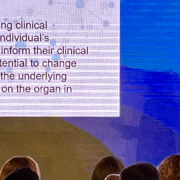Implementing genomics across the UK
We explore a new paper that sets out the UK’s genomics healthcare plan for the next three years
A new document published by the UK government, in collaboration with the Welsh and Scottish governments and the Northern Ireland Assembly, details the ‘shared commitments’ being made to roll out genomic medicine and industry across the UK.
“By coming together and agreeing these new shared commitments, we will ensure patients across all 4 nations of the UK can benefit from these pioneering advancements and cement our place as a world leader in research and genomics,” said the Secretary of State for Health and Social Care, Sajid Javid.
The new commitments lay out the plans for implementing the Genome UK strategy from 2022 to 2025, and will be followed by detailed plans from each of the four nations later this year.
The strategy so far
This publication follows on from 2020’s Genome UK: the future of healthcare strategy, which set out a 10-year plan to deliver the benefits of genomic medicine thorough the NHS, while supporting the development of the UK life sciences sector.
The 38 commitments build on the core pillars of diagnosis and personalised medicine, prevention and research, as well as the ‘cross-cutting themes’ laid out in the Genome UK strategy. You can learn more about the strategy in our blog article.
The strategy was followed by the 2021-2022 implementation plan, which set targets for the NHS Genomic Medicine Service, Genomics England and NHS Improvement. It also covered the establishment of the Office for Life Sciences, an organisation that sits across the Department of Health and Social Care and the Department for Business, Energy and Industrial Strategy.
So, what are the commitments?
Priorities relating to healthcare include:
- Infectious disease and Covid-19: building on partnerships developed during the Covid-19 pandemic, the UK Health and Security Agency will work with governments and agencies in all nations and regions to develop public health pathogen genomics services across the UK.
- Cancer: more personalised diagnosis and treatment will be achieved through genomic testing as part of NHS care. As a result, more patients will be able to access molecularly matched therapies that only work for cancers with specific markers, and more patients will be able to access appropriate clinical trials.
- Pharmacogenomics: the NHS Pharmacogenomics Test Evaluation Working Group will review current systems and infrastructure to see how pharmacogenomic testing can be integrated to reduce harmful prescribing.
- Newborn genome sequencing will be evaluated to see whether and how this technology would benefit families by increasing the early detection of diseases. A research pilot led by Genomics England will feed into the investigation, and the evaluation will consider both effects on health outcomes and issues around genomic data storage and wider ethical challenges.
- Rare disease commitments build on the UK Rare Diseases Framework launched in 2021. The four nations will devise specific action plans to deliver improvements to rare disease diagnosis, notably reducing the length of the diagnostic odyssey for patients. For treatment, approved advanced therapy medicinal products (ATMPs) such as gene therapies will be supported, with clinical genomic testing helping identify patients who could qualify and benefit.
–









